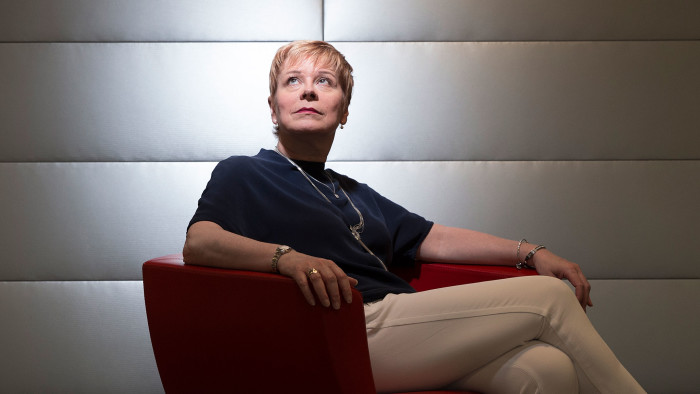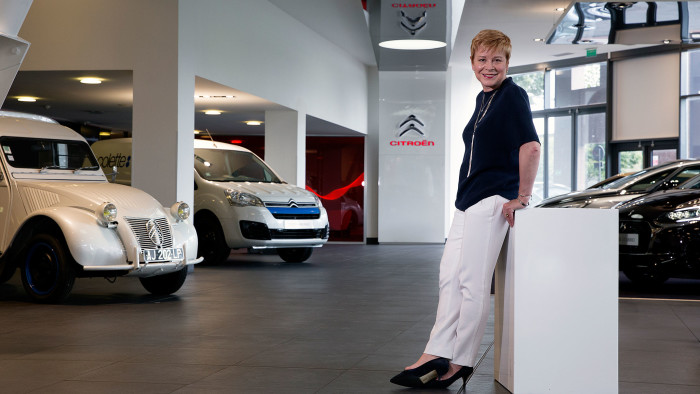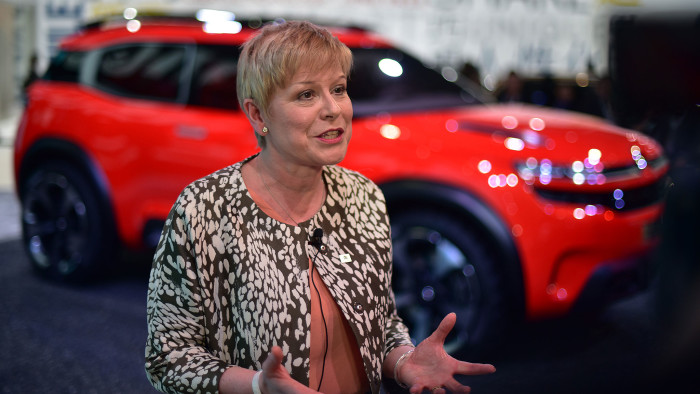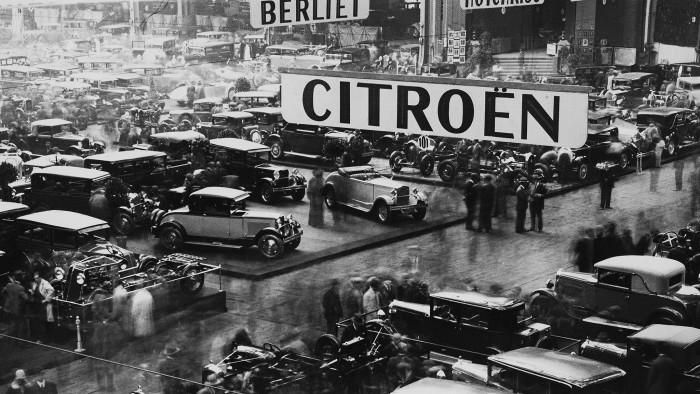How an EMBA fuelled Linda Jackson’s drive to become Citroën CEO

Roula Khalaf, Editor of the FT, selects her favourite stories in this weekly newsletter.
Linda Jackson arrived in the car industry almost by accident. The British boss of Citroën took a holiday job stapling invoices at Rover as a teenager and four decades later finds herself as chief executive of a brand that sells more than a million cars a year.
From the start she became enthralled with the car world, eventually turning down a place to study teaching at university in Sussex in order to stay at the Midlands automaker. “I felt . . . I actually quite like working,” she says, sitting in an office that looks out over an array of vehicles that fill the entrance foyer in Citroën’s Paris headquarters.
The decision to build a career in the car industry was not the end of the road for further education. Once she was embedded in the business, Rover spotted her potential. The company sponsored her through an executive MBA at Warwick Business School, which she pursued through a series of evening classes while working on the continent part of the time managing the group’s finances.
“It was tough,” she admits, “but that’s what you do when you want to do it all. I was flying into Birmingham airport, getting in the car and going to Warwick university for night school.”
On the programme, Jackson worked alongside a variety of people, from a purchasing specialist for engineering company GKN to a farmer and a manager for the NHS — all of whom were juggling full-time jobs and study. “You can actually become quite insular because my world is the automobile world,” she admits. “But you get on to one of those courses and it opens your eyes.”

Drawing on the NHS manager’s experience, for example, the students studied the complex processes used by hospitals to obtain results from patients’ blood tests, and how they could be improved. “And it’s exactly the same as the process of building a car, or of launching a vehicle,” she says.
“You might be in a different industry, but actually you’re facing the same problems and what the MBA does is give you tools and ability to be able to manage that. Because you’re looking at so many subjects, you have to have the ability to stand back and really analyse things rather than rushing in like a bull in a china shop.”
She has “no regrets” about taking the demanding course. “I really do believe that I wouldn’t be here without it. I had gone into the industry without a degree, so having an MBA gave me much more confidence. “It widens your eyes and your perspective as to where you might go.”
The EMBA set her on a trajectory that saw her work for Rover in France and the UK, before being headhunted to become Citroën’s UK finance director in 2005. She was initially reluctant to leave Rover after a three-decade career, but she knew the company was in dire straits.
“It was a sad place then. It was a big decision. I told my boss and he said: ‘If I were you, I’d go,’ ” she recalls. Four months later the group collapsed after failing to find a buyer.
After working as Citroën’s finance director in France, a role she took up in 2009, she returned in 2010 to Britain as the brand’s UK managing director before being offered the top job back in Paris in the summer of 2014.
CV
1977-92 Roles across the Rover group in finance and sales for the UK and Europe
1988-92 EMBA at Warwick Business School
1993-2004 Worked her way up in Rover, from the UK arm to become the finance controller for MG Rover group
2005-09 Finance director at Citroën, UK, moving to the equivalent position in France in 2009
2010-14 Managing director for Citroën UK and Ireland
2014-present Global chief executive for the Citroën brand
Jackson remembers sitting outside the office of Carlos Tavares, the chief executive of PSA Peugeot Citroën, the brand’s parent company, alongside the company’s HR director on a Friday evening and thinking she had done something wrong. Once inside, “he asked if I like travelling,” she recalls.
“I said yes, but thought they were going to send me to Mongolia.” Tavares offered her the job and she accepted by the Sunday.
“I didn’t realise quite how big a commitment it was. It consumes you,” she says. Her travel schedule is gruelling. “I tell people my fitness regime is to do a certain number of steps per day, but most of them are in Charles de Gaulle airport.”
More than half her time is spent travelling to countries where the brand sells cars, which range from Brazil to China, often being on the ground for only a matter of hours. In China she has cut unprofitable models, even though they cost the brand market share, a similar strategy to the one the group pursued in Latin America.
In the UK, Citroën’s third-largest market behind France and China, she has raised prices to offset the fall in the pound following the Brexit referendum.
The whole company, including both Peugeot and Citroën, is on a turnround plan designed to cement profitability. Last year, Citroën’s global vehicle sales fell 2 per cent to 1.16m, while sales of the upmarket DS brand that also comes into her remit dropped 14 per cent to 102,000. But that is part of a plan. “I would rather be stable than be growing and losing money,” she says. “That’s the decision you make.”
Earlier in the summer, she was named as the most influential woman in the Great British Women in the Car Industry awards run by Autocar and the Society of Motor Manufacturers and Traders. She hopes the award — “such an honour” — will “inspire women to pursue a career in the automotive industry”.
Gender balance, though by no means resolved, is an area where the motor industry has seen a lot of change. Having a woman in her role “would be impossible to think of” 10 years ago, she says. “When I told people I worked in the car industry they used to think I was a mechanic.”

During her EMBA, the gender mix of the group was very heavily skewed in favour of men. “I remember there being about four women and the rest were men,” Jackson says, though she admits even those figures were better than the world she had come from. “At that time I would go to senior management [meetings] with the top 300 people at MG Rover and you’d look round and there would be two other women.”
That, however, did have its small advantages. “Being a woman, providing you do a great job, everyone remembers you. Though it’s not very politically correct to say that, I’m afraid.” Despite this, she remains a staunch opponent of quotas for the number of women in senior roles. “If there were quotas, I would always be thinking ‘did I get this job because they had a quota to fill?’,” she says.
She met her late husband, David, at Jaguar, and he was her unofficial “research assistant” during her EMBA. He died from cancer in the summer of 2014, when she was only months into her new role at Citroën. He was a “great influence and a great support” and was the one who persuaded her to accept the top job at Citroën.
We are still talking after six on a summer evening, but outside the temperature remains above 30C and cars clog the roads as Parisians head off for their traditional long summer holidays. Over the years working between France and the UK she has seen the cultural barriers between the two nations lowered, if not entirely eliminated.
Her first encounter with French business practices was as finance director at Rover in France in 1998. Keen to prove her ability in the new role, Jackson called a meeting of some of the division’s most senior employees on her first day. “I remember thinking I had got this sorted,” she says.
What followed was something of a cultural awakening. With five minutes to go until it started, she was the only person in the room. After 10 minutes, the first colleague ambled in, followed shortly by another and then more. By quarter past the hour, the seats around the conference table were eventually filled. But such was the grandstanding that only the first two items on the lengthy agenda were discussed in the allotted hour.
Now she keeps meetings shorter — and gives an earlier start time to renowned latecomers.
The diplomatic road runs both ways though, with co-workers originally bewildered by her English tea-drinking habits. “Now I go to dealers and they get the tea out.”
But then, she is the boss.

Comments